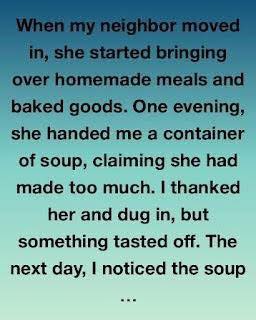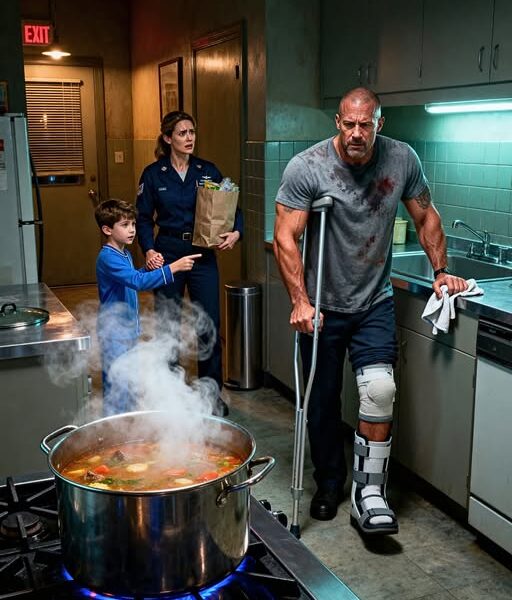When my new neighbor moved in, she seemed like the kind of person you’d trust instantly. Within days, she was bringing over meals and baked goods as though we’d been friends for years. At first, I thought it was sweet—old-fashioned hospitality you don’t see much anymore.
But then came the soup.
One evening, she appeared at my door with a container of steaming broth. “I made too much,” she said warmly, pressing it into my hands. I thanked her and later dug in, but something about it was off. Not spoiled, not rotten—just… wrong. There was a strange aftertaste that lingered long after I set the spoon down.
The next evening, my stomach cramped, and I felt lightheaded. I brushed it off. Sensitive gut, I told myself. Nothing more.
Her name was Mirela. She was in her late fifties, with graying curls, soft features, and a smile that could disarm anyone. Her voice was gentle, too—almost lullaby-like. She radiated kindness. Or at least, that’s what I thought.
A few days later, she brought me banana bread. I took a polite bite. Again, the taste unsettled me. This time, metallic. Subtle but unmistakable.
That’s when the unease in my gut became suspicion.
I threw the rest away but kept one piece in a plastic bag—“just in case.” Proof of what, I wasn’t sure.
The Pattern
Over the next week, Mirela’s generosity escalated: chicken stew, herbal tea, apple turnovers. She was relentless. Every refusal I gave—“I just ate,” “I’m fasting,” “I’m allergic to cinnamon”—was met with her polite smile, but her eyes narrowed ever so slightly, as though cataloging my excuses.
The more food she brought, the less I trusted her.
Best restaurants near me
Best restaurants near me
Then, Clara came over. My best friend, staying for the weekend while her apartment was being fumigated. I forgot to warn her.
Right on cue, Mirela rang the bell with a basket of pastries.
Clara beamed, oblivious. “Oh wow, thank you so much!” Before I could react, she took a bite.
Later that night, she grew dizzy and nauseous. She blamed dehydration. I knew better.
When I told her what I suspected, Clara laughed. “You think your neighbor’s poisoning you? Come on. That’s wild.”
Maybe it was. But I couldn’t shake the truth I felt in my bones.
The Test
I gathered everything Mirela had given me—the soup container, the tea, the bread—and sent it to a private lab for toxicology tests. Expensive, yes. But I needed answers.
A week later, the results came back.
The lab tech’s voice was careful. “We found trace amounts of a benzodiazepine derivative. Very small doses. Not lethal, but definitely not something you should be ingesting.”
I froze. My worst fear confirmed.
It was real.
The Note
I called Clara immediately. “She’s drugging us.”
“Why, though?” Clara asked. But I had no answer.
I went to the police with the report. They listened, asked Mirela a few casual questions, but without proof of intent, their hands were tied.
I felt powerless. Until the next day.
A note appeared under my door.
Be careful who you trust. She’s done this before.
No name. No signature. Just a warning.
The Digging
That night, I pressed Mirela with casual questions. Why she’d moved here. Where her family was. She smiled, but I saw the flicker of irritation in her eyes. “I prefer my solitude,” she said quickly, before handing me a tomato tart.
I didn’t touch it.
Instead, I started digging. Using a photo from a local barbecue, I ran a reverse image search. Hours later, I found an article from a small-town paper, nearly ten years old.
The headline chilled me:
Local Woman Suspected in Mysterious Illnesses of Neighbors—No Charges Filed.
The photo was unmistakable. Same curls. Same smile. Different name.
My blood went cold.
The Truth
This time, the police took me seriously. They searched her home.
What they found was worse than I’d imagined:
- Jars of herbs laced with ground-up prescription meds.
- A notebook of recipes, with dosages scribbled beside each dish.
- Photos of neighbors from her past towns, annotated with notes like “slower response to tea” and “increase dose.”
And then—my name. Written in her book.
Buy bestselling books online
Mirela was arrested.
She had been moving from town to town for years, changing her name, building trust with neighbors through kindness, and slowly drugging them. Not to kill—but to control.
She liked being needed. When people grew sick, she became indispensable: offering rides, checking in, delivering “healing” food. It made her feel important.
Aftermath
Once she was gone, the neighborhood felt lighter. We even held a block party. For the first time in weeks, I ate freely.
Best restaurants near me
When a young couple moved into her old unit, I baked them brownies as a welcome. They laughed nervously, “There’s nothing weird in these, right?”
“Just sugar, butter, and a lot of trauma,” I joked.
But I wasn’t entirely joking.
A few days later, another note slipped under my door.
Good job. She got what she deserved.
This time, it was signed. Alina.
After some digging, I discovered she’d been Mirela’s neighbor in her previous town—the one who had first suspected her but could never prove it.
Alina had been sick for months, drinking Mirela’s teas, until she stopped. Her symptoms faded. But by then, Mirela was gone.
“I always knew she’d do it again,” Alina told me when we finally connected online. “I’m glad you stopped her.”
The Lesson
Months have passed. Sometimes, I still hesitate before accepting food from anyone. But I’ve learned something important.
Best restaurants near me
Kindness is beautiful, but trust must be earned.
Not everyone who smiles has good intentions. And not everyone who warns you is paranoid.
Listen to your instincts. Be cautious. Ask questions.
And if banana bread tastes metallic? Throw it out.


